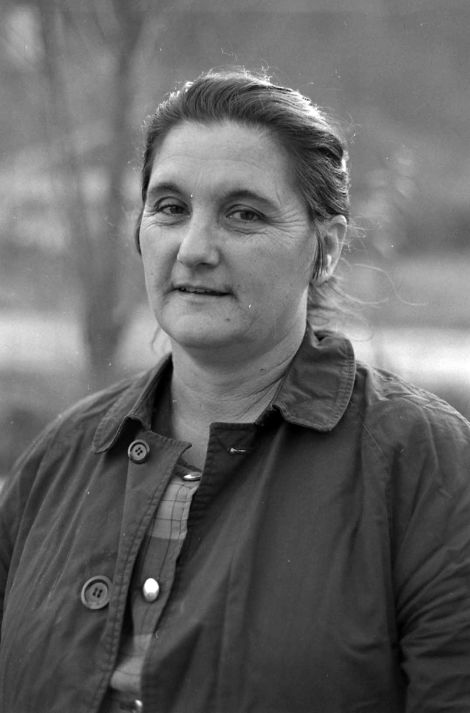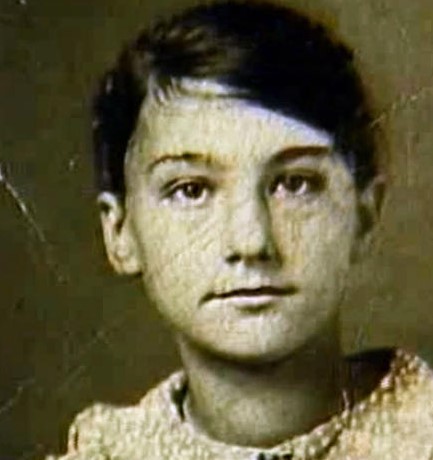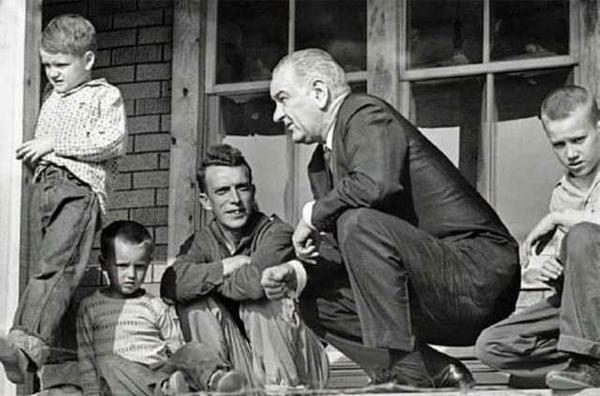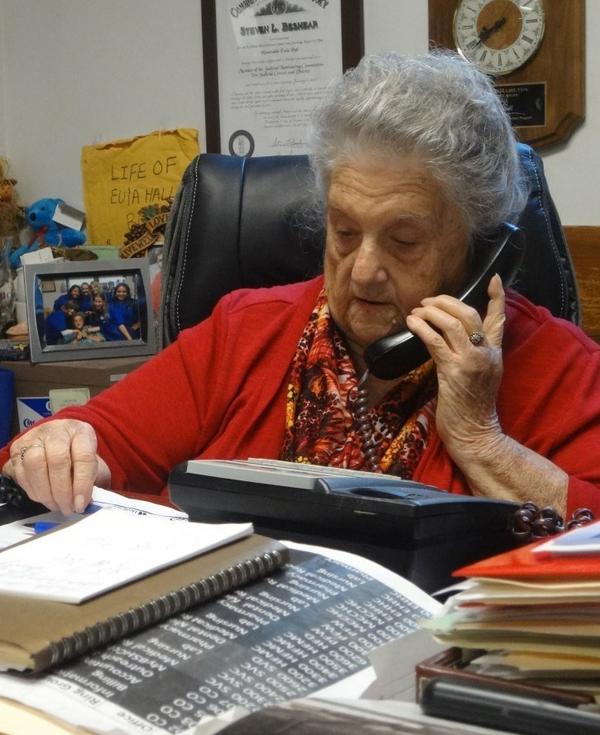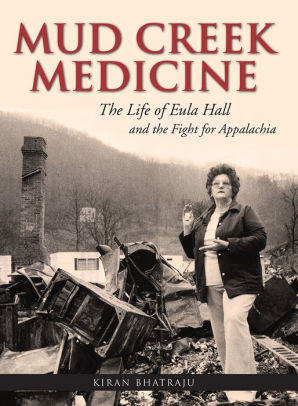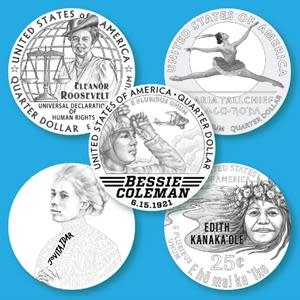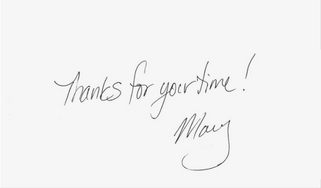September 16, 2022 Hello , Thank you all for your wishes for my
good health! I have recovered from covid and am doing great. I won't be writing a newsletter again until late October, when I will have an update on the progress of my young adult novel, and my search for a new agent. Lots of exciting things happening! One of which is a holiday in Greece with my husband, delayed these past two years
due to the pandemic. We will soon be in the land of Socrates, Plato and Aristotle! The Acropolis, Parthenon and Olympia! I leave you with the story of an Appalachian woman, described as a "saint" by a congressman, and a legend in her own time. I first wrote about Eula Hall three years ago, but when I learned this past week of her
death, I was moved to tell her story again. She died last year at age 93. Up until the covid pandemic, Eula Hall worked every day at the Mud Creek Clinic, which she founded nearly fifty years ago in rural Floyd County, Kentucky. At the time, it was the first, and only, clinic in Appalachia where poor people could see a doctor. The office charged fees on a scale
that slid all the way to zero.
“I knew what it was like to suffer... I couldn't stand it
anymore."
Eula was a 40-something mother of five in 1973 when she opened the health clinic in Grethel, KY. She had an eighth-grade education and a driving sense that medical care was a right, not a privilege. “Nobody was turned away regardless of their income,” Eula said. "[They'll be] treated with respect and we’ll give them the best we have to offer. Eula said, "I’ve fought like hell to get what we've got."
Today, it's called Eula Hall Health Center, and she made one last visit when the hearse driving her to her final resting place detoured to circle the clinic. Portrait of Eula Hall by Kristen Mendenhall. C. 1971. Kristen Mendenhall Collection, Appalshop Archive.
Eula convinced two doctors from a regional hospital to each one day a week for $1 a day. She drove to pick up patients in her own car, and often spent evening hours delivering prescriptions. When the clinic became overwhelmed in 1977, because patients traveled from Tennessee, West Virginia, and Ohio to see a doctor, Eula moved the clinic from its location in a rented trailer to her own house. She moved her family into the trailer. "My dream from the time I was a child was a health facility where nobody would be turned away." Eula's dream was planted in the poverty of her childhood in the 1930s and grew decades later when harsh realities still plagued her community.
"You don’t know what it’s like to have a kid with a temperature of a hundred and two, hundred and 3, hundred and four, and not even a Tylenol to give, no phones. You sit and rock
your baby. They cry, you cry." Eula gave birth to her five children at home without ever seeing a doctor. This, after watching her own mother nearly bleed to death when she was six. Her mother started to hemorrhage after two days and two nights of labor in their four-room shanty. Her father gave the family's heifer and a hog to bring the
doctor and save her mother's life. The baby was stillborn. "People suffered, they really suffered and died for the lack of health care," Eula said. She remembers the neighbor children crying
on their porch after their mother's funeral. The woman died from tetanus after stepping on a rusty nail. Eula knew children who died of whooping cough and malnutrition due to parasites. “I seen the worms come out of their noses and mouths.” In 1964, President Johnson declared war on poverty and visited Appalachia
where he found families living in shacks with no electricity or running water. Below, a family is dressed in their best to meet the president.
President Johnston's efforts included the Volunteers in Service to America, VISTA. "For the war against poverty will not be won here in Washington. It must be won in the field, in every
private home, in every public office...Our aim is not only to relieve the symptoms of poverty but to cure it–and above all, to prevent it." Eula signed up. She became one of two VISTA volunteers assigned to Eastern Kentucky. When the War on Poverty failed, she moved forward with her dream. With $1,400 in donations, Eula started the Mud Creek Clinic. She also worked to get federal money to pipe in clean water, after she discovered ninety percent of families in the region were drinking from contaminated wells. She advocated on behalf of miners afflicted with black lung disease. And Eula offered empathy and support
to battered women, having had a husband who at separate times broke her jaw, ribs and stabbed her face. She seemed to have boundless energy and determination to help people through hard times. “I knew what it was like to suffer,” she
said. (Photo below by Taylor Sisk/100 Days in Appalachia)
In 1982, Eula suffered a huge setback when her clinic burned to the
ground, the suspected arson never solved. She believed the fire may have started while someone was stealing drugs, but she'd also made enemies criticizing the region's coal producers. There was never any question the clinic would reopen. Within days, the staff was treating patients at a picnic table under a nearby willow tree, and Eula took calls at a telephone installed on a tree. With school out
for the summer, the clinic made a temporary home at the elementary building. Eula led the fundraising effort that rebuilt the clinic. The clinic has become a community center, including a food pantry and clothing room. Eula has continued working as a patient advocate and social director, which
includes doing everything from raising money, to helping people navigate access to benefits like disability, social security, medicaid, workers comp and food stamps. who lived in Appalachia while his father was a doctor at the clinic. The reviews are great. Check one out here...
When I wrote this story in 2019, had given up driving, but worked to arrange rides for patients with no cars. “It gives me joy to help people. If I get down here, I can do it or get it done,” she said. “I’m gonna do what
I want to as long as I know what I’m doing.” Born in a "holler" with little education, Eula faced huge personal obstacles, yet sharpened her innate leadership skills, cultivated compassion and courage, and she would say "stubbornness" to accomplish more for the health of her community than the entire War on Poverty. She did it because, in her
words, she "couldn't stand it anymore."
The 2023 series will feature: • Bessie Coleman, first African American and first Native American woman pilot.
• Edith Kanakaʻole, indigenous Hawaiian composer, custodian of native culture and
traditions.
• Eleanor Roosevelt, first lady, author, and civil liberties advocate.
• Jovita Idar, Mexican American journalist, activist, teacher, and suffragist; and
• Maria Tallchief, America’s first prima ballerina. And be sure to look in your change for the latest coin in the 2022 series, the newly released Nina Otero-Warren quarter! Nina was a woman's suffragist, educator, and one of New Mexico's first female government officials. I'll be back in late October. Take care!
Read a great book? Have a burning question? Let me know. If you know someone who might enjoy my newsletter or books, please
forward this e-mail. I will never spam you or sell your email address, you can unsubscribe anytime at the link below.
To find out more about my books, how I help students, teachers, librarians and writers visit my website at www.MaryCronkFarrell.com.
Contact me at MaryCronkFarrell@gmail.com. Click here to subscribe to this newsletter. |
Author Mary Cronk Farrell
|
Stories to Inform & Inspire
|
|
|
